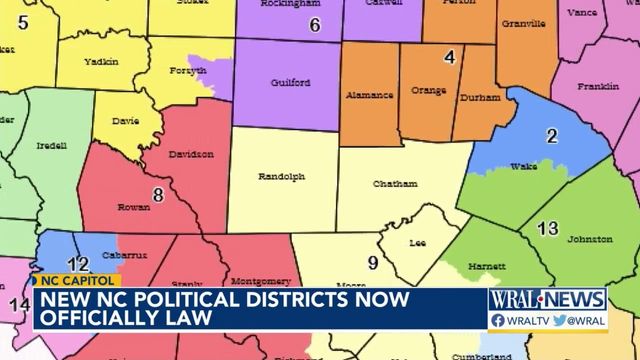New NC political districts -- now law, despite protests -- could cement GOP power for years
More North Carolinians are likely to be represented by Republicans in the state legislature and U.S. Congress for years to come under new election districts that became law Wednesday after final approval by state lawmakers.
Drawn by Republican lawmakers who control both chambers of the General Assembly, the maps could help the GOP maintain — and likely strengthen — the party’s veto-proof supermajority in the legislature through 2030.
The new maps are also expected to have national impact: The congressional districts are projected to help Republicans gain at least three new seats, and possibly four, in the U.S. House of Representatives, where national Republicans currently hold a slim majority.
But that’s if the maps can withstand expected legal battles. If they do, they'll be used for the rest of the decade. But it's not a guarantee. Anti-gerrymandering groups protested outside the legislative building ahead of Wednesday’s votes, saying the maps unconstitutionally discriminate against Black voters and other minority groups. And one or more lawsuits are expected to be quickly filed against the new maps, now that they’re law.
Congressional Democrats, including U.S. Rep. Wiley Nickel who represents a Triangle-area district, decried the maps. Nickel’s district, the state’s most closely contested in the 2022 election, was redrawn to include more Republican voters. In a statement, he said competitive districts like his give voters “a real chance to make their voices heard and pick the candidate with the best ideas.”
He called the newest districts extreme partisan gerrymanders by Republicans, adding: “It’s time to sue the bastards.”
Republicans, meanwhile, say the maps are fair and lawful.
"We believe the maps ... will be upheld by the courts," said a top redistricting official, Sen. Paul Newton, R-Cabarrus.
North Carolina Republicans have lost numerous gerrymandering lawsuits in the past decade; the only reason the maps are being redrawn now is because of a 2021 lawsuit. But future lawsuits could be less likely to succeed, particularly in state court. Republicans flipped control of the North Carolina Supreme Court in the 2022 elections, and one of the new majority’s first actions was to overturn an anti-gerrymandering precedent, giving Republican legislators confidence in their actions now.
"There's no doubt the congressional map we're voting today has a lean toward Republicans," said Rep. Destin Hall, R-Caldwell, another top redistricting official. He defended that as not just allowed by the recent court ruling, but also an expected part of politics — since Republicans control the legislature and are therefore in charge of drawing the maps.
In addition to Nickel, the congressional map will put Kathy Manning of Greensboro and Jeff Jackson of Charlotte into new districts that lean heavily Republican. The map also turns the northeastern district held by Rep. Don Davis, R-Greene, into a competitive seat.
Even before the maps were approved, Republican candidates began making moves. On Wednesday, as lawmakers debated the maps, Republican gubernatorial candidate Mark Walker said he would exit that race and pursue the 6th Congressional District seat currently occupied by Manning, and which now will lean solidly Republican.
“Since the maps were released only a week ago, our campaign has already received close to [$500,000] in pledges from supporters across North Carolina,” Walker said in a statement.
North Carolina's political geography
The new congressional districts would be expected to give Republicans at least 10 of the state’s 14 U.S. House seats — even if more than 50% of voters statewide cast their ballots for Democratic candidates. Likewise, Republicans would be expected to keep majorities in the legislature, and possibly supermajorities, even if most voters wanted Democrats.
GOP leaders argued that the statewide vote doesn't matter, at least when it comes to control of the legislature or the U.S. House delegation. They said Republicans have a built-in advantage in elections that rely on districts because of political geography: The fact that Democrats tend to be clustered in urban areas, while Republicans are more evenly spread out.
"As we all know, members of this body don't run statewide," Hall said. "We represent districts."
Democrats responded that while that may give Republicans a slight advantage, there's no question in their mind the map is extremely gerrymandered. Rep. Tim Longest, D-Wake, pointed to a recent analysis by Duke University experts that used an algorithm to create 100,000 different hypothetical versions of the maps. None of those hypothetical maps favored Republicans as heavily as the new maps will, the analysis showed.
"I know my party has work to do to rebuild in rural areas, but the result pre-ordained by this map is not explainable by political geography alone," Longest said. "This map secures more Republican seats than 100,000 randomly generated maps. That is not explainable by geography."
Democrats in both chambers of the state legislature proposed amending the congressional maps — to instead keep the lines already in place now. Republicans shot down those proposals both times. The current district lines were drawn under court order, after the GOP's 2021 attempt at redistricting was ruled unconstitutional. The court-ordered districts led to Republicans and Democrats each winning seven of the 14 U.S. House seats in 2022.
The Princeton Gerrymandering Project, which analyzes redistricting proposals nationwide, rated North Carolina’s 2022 congressional map as an ‘A.’ That map was drawn by a team of experts including Sam Wang, who leads the Princeton Gerrymandering Project. The group gave the new congressional map an ‘F’ grade — something that Rep. Amos Quick, D-Guilford mentioned when he urged Republicans to keep the old maps.
“If our schools in this state were graded an 'F,' we would be doing something about it,” he said.
'All for the sake of political gain'
The activists who protested Wednesday said Republicans used the new lines to carve up minority communities and dilute the influence of Black, Hispanic and Asian voters, instead giving disproportionate political power to white voters. The claims foreshadowed possible arguments in lawsuits that will likely soon be filed, seeking to strike down the new maps.
"This perversion of gerrymandering has cut our communities apart," said Kyle Brazile, the director of civic engagement at the N.C. Counts Coalition, a progressive group based in Raleigh.
Cassandra Stokes of the N.C. Black Alliance called the maps "state-sanctioned discrimination."
"One can see how this gerrymandering not only ruptures the Black Belt [in eastern North Carolina] but also ruptures Black alliances and Black power building between communities, all for the sake of political gain," said Stokes, the group's democracy and economy coordinator.
Republican redistricting officials have repeatedly said they didn't use racial data in drawing the maps. When Democrats have pointed to heavily Black areas split by the new districts, Republicans have often responded that the lines were drawn purely for political gain, and with no regard to race.
That distinction, however, could raise broad questions in court about race and politics in a state like North Carolina — where Black voters overwhelmingly support Democratic politicians, and where 90% of registered Republican voters are white.
During Wednesday's Senate debate, Sen. Mary Wills Bode, D-Granville, asked Newton and other Republicans whether they believe elections should be fair, or if it's OK to rig political districts in favor of one political party.
Republicans objected to the premise of her questions, given the recent Supreme Court ruling that greenlit partisan gerrymandering.
"The courts have allowed partisan considerations to be one of the criteria, and we're doing that," said Sen. Warren Daniel, R-Burke.
Bode led an anti-gerrymandering group before her election to the Senate last year in a highly competitive district that includes part of the northern Wake County suburbs. She will now see her district redrawn to favor Republicans in future elections, although it could remain competitive.
Many other Democratic politicians in the state legislature and Congress are similarly facing the prospect of being drawn into newly Republican-leaning or safely Republican districts under the new maps.
"Passing these maps, which are unfair and provide partisan advantage and thereby silence some voters or others, is wrong," Bode said.











